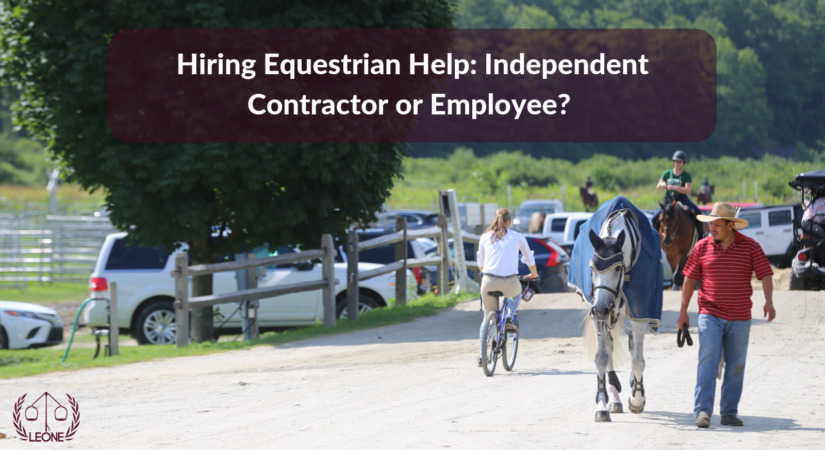Q: I own and oversee my own barn, and I’ve just arranged to hire an instructor/trainer for the first time! To start out, the trainer will likely only be working about 10-15 hours a week, with the hope of adding additional hours down the road, and she will continue doing some additional training elsewhere as well.
With that in mind, I’d really like to bring her on as an independent contractor rather than an employee. Is that the correct thing to do in this situation?
A: Good question! The short answer in your situation sounds like a yes; however, to really get to that answer, I think it’s important to go over the differences between an employee and an independent contractor and to answer a few questions for yourself about the new hire.
If the trainer is hired as an employee, you are legally responsible to pay employment taxes, withhold the trainer’s share of employment taxes, and report the wages to the government. Additionally, you’re require to adhere to any laws related to safety, wages, and hours, and if the trainer is injured at your barn, you could be legally liable.
If the trainer is hired as an independent contractor, she will be responsible for her own tax withholding and her own insurance – and your liability can become greatly limited.
After reading that, it likely sounds like you’d obviously want to go the independent contractor route, right? Unfortunately, not so fast.
Anyone who wrongly calls an employee an independent contractor risks some serious consequences, such as major financial penalties from the IRS!
That’s why it’s important to ask yourself these few questions, and, if you desire to go the independent contractor route, to set the relationship up accordingly.
Will the trainer be using her own tack and horses and/or the tack and horses of the clients she’s instructing? Or will she be using your equipment and horses?
If the trainer is utilizing her own equipment and horses or the horses of the clients riding them, this points more toward an independent contractor relationship. However, the more the trainer is utilizing your property – including horses, the more likely she is to be considered an employee.
Will the trainer have control over how much income they make?
In an independent contractor relationship, the trainer should have a say in how much profit she makes on each lesson; she should collect the payment from students, and she should be able to take on as few or as many clients as she sees fit, allowing her to somewhat control her income.
If you desire to handle collecting payments from students, want to then pay the trainer your set amount for each lesson, and also want to limit the trainer to only working a set number of hours or lessons per week, as determined by you, then you are looking at more of an employee relationship.
Will you be setting the trainer’s hours or, within reason, is she free to schedule the lesson times that best suit her?
The IRS guidelines state that “You are not an independent contractor if you perform services that can be controlled by an employer.”
If you say, for example, that the trainer must be present from 4-8 p.m. on Tuesdays and Thursdays to either instruct or offer assistance at the barn, you are actually controlling the trainer’s services and when she must be there, and the IRS is more likely to consider this an employee relationship.
In an independent contractor relationship, the trainer would have the freedom and flexibility to schedule lessons, say from 8 a.m. to 7 p.m. Tuesday through Sunday, at her own discretion.
Will the trainer be there full-time?
You already answered this in your initial question, but it is important to consider: if the trainer’s hours continue to build to the point that she is considered full-time and your farm is her sole place of work, she is far more likely to be considered an employee by the IRS!
If the answers to these few questions still have you leaning toward independent contractor, then the answer remains yes: that is correct in your situation!
In that case, make sure that the trainer has her own appropriate liability insurance and be sure to both sign off on an independent contractor agreement!
For additional questions, guidance, or legal counsel, never hesitate to contact Leone Equestrian Law!

